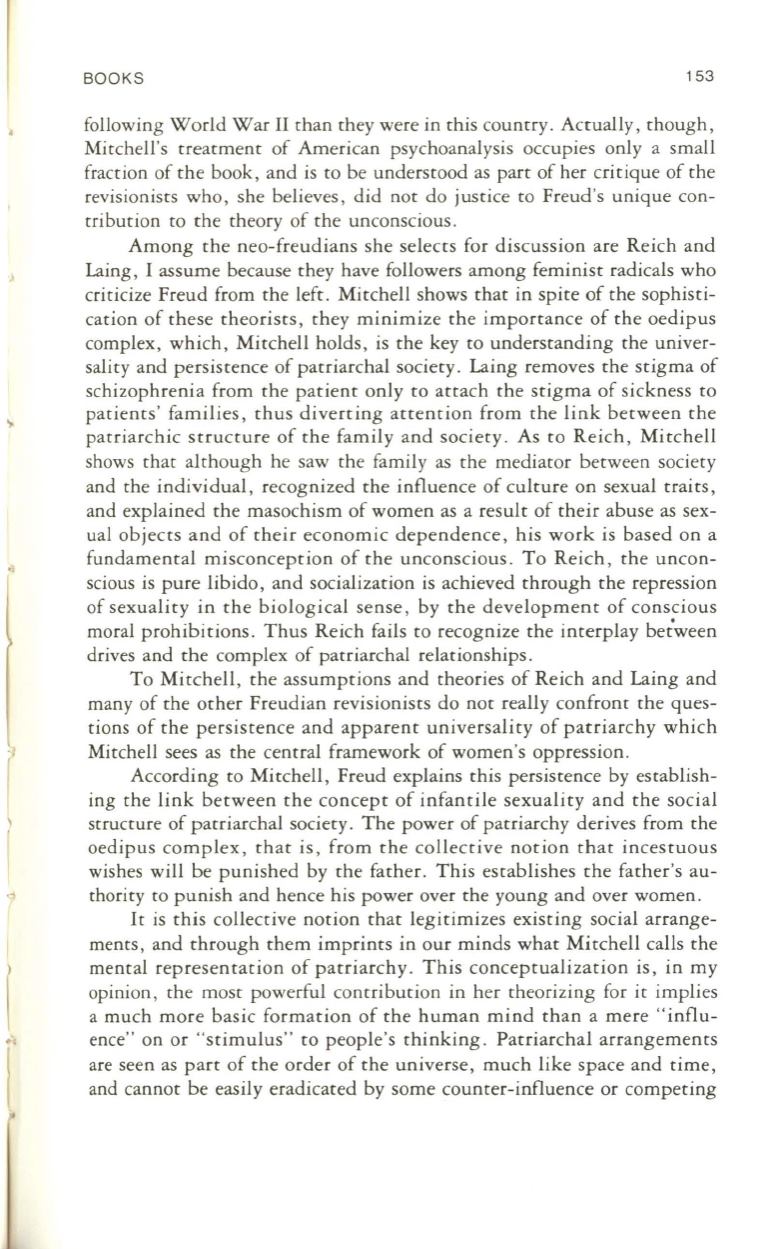
BOOKS
153
following World War II than they were in this country. Actually, though,
Mitchell's treatment of American psychoanalysis occupies only a small
fraction of the book, and is to be understood as part of her critique of the
revisionists who, she believes, did not do justice to Freud's unique con–
tribution to the theory of the unconscious .
Among the neo-freudians she selects for discussion are Reich and
Laing, I assume because they have followers among feminist radicals who
criticize Freud from the left. Mitchell shows that in spite of the sophisti–
cation of these theorists, they minimize the importance of the oedipus
complex, which, Mitchell holds, is the key to understanding the univer–
sality and persistence of patriarchal society. Laing removes the stigma of
schizophrenia from the patient only to attach the stigma of sickness
to
patients ' families, thus diverting attention from the link between the
patriarchic structure of the family and society. As to Reich, Mitchell
shows that although he saw the family as the mediator between society
and the individual, recognized the influence of culture on sexual traits,
and explained the masochism of women as a result of their abuse as sex–
ual objects and of their economic dependence, his work is based on a
fundamental misconception of the unconscious . To Reich, the uncon–
scious is pure libido, and socialization is achieved through the repression
of sexuality in the biological sense, by the development of conscious
moral prohibitions. Thus Reich fails
to
recognize the interplay between
drives and the complex of patriarchal relationships .
To Mitchell, the assumptions and theories of Reich and Laing and
many of the other Freudian revisionists do not really confront the ques–
tions of the persistence and apparent universality of patriarchy which
Mitchell sees as the central framework of women's oppression.
According to Mitchell, Freud explains this persistence by establish–
ing the link between the concept of infantile sexuality and the social
strucrure of patriarchal society. The power of patriarchy derives from the
oedipus complex, that is, from the collective notion that incestuous
wishes will be punished by the father. This establishes the father's au-
'"
thority to punish and hence his power over the young and over women.
It is this collective notion that legitimizes existing social arrange–
ments, and through them imprints in our minds what Mitchell calls the
mental representation of patriarchy. This conceptualization is, in my
opinion, the most powerful contribution in her theorizing for it implies
a much more basic formation of the human mind than a mere "influ–
ence" on or "stimulus"
to
people's thinking. Patriarchal arrangements
are seen as part of the order of the universe, much like space and time,
and cannot be easily eradicated by some counter-influence or competing


